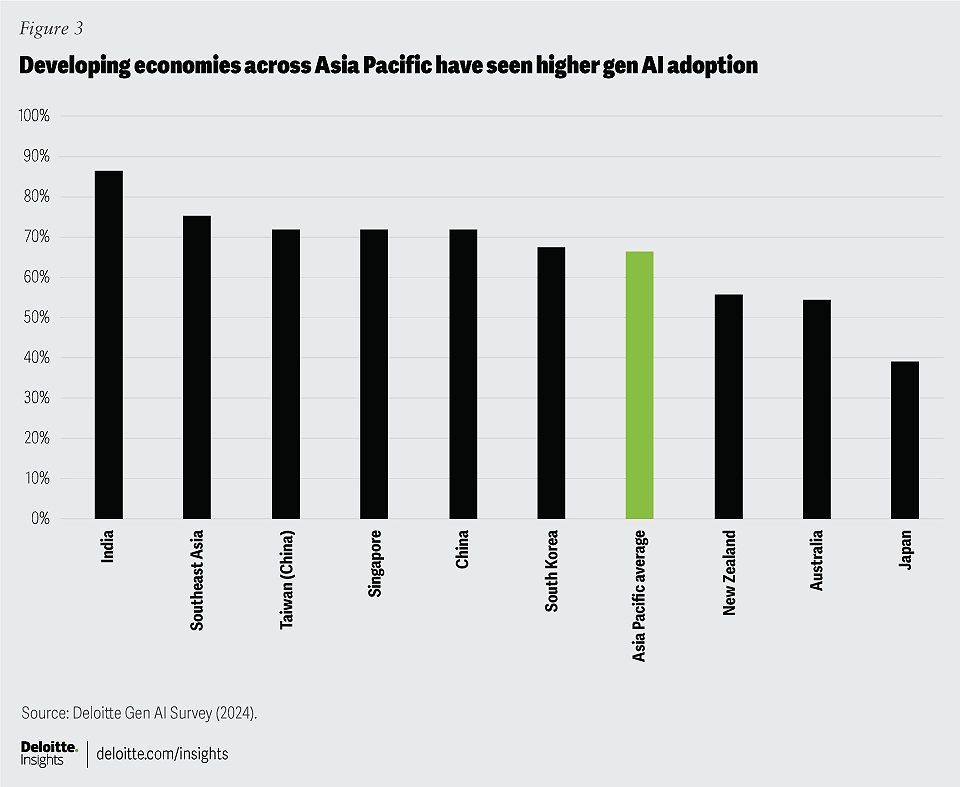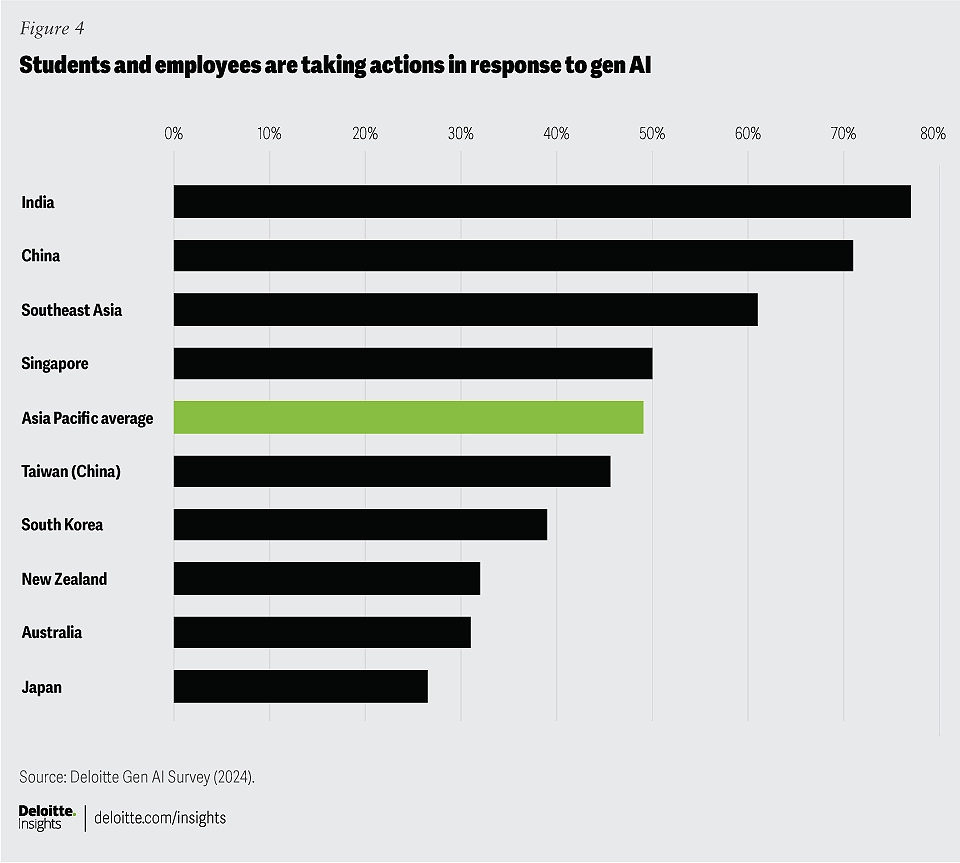India Leads in Generative AI Adoption: Nearly 90% of Students and Employees Actively Engaged

Generative Artificial Intelligence (GenAI) has captured global attention with the emergence of groundbreaking tools like ChatGPT, Gemini, Midjourney, and GitHub Copilot. These innovative technologies have sparked a paradigm shift in how we approach problem-solving and creativity. Deloitte’s recent report underscores India’s pioneering role in GenAI adoption within the Asia Pacific region. Interestingly, a staggering 93% of surveyed students and 83% of employees in India actively engage with Gen AI, setting them apart as frontrunners in embracing this transformative technology.
Developing economies, including China, India, and Southeast Asia, are experiencing a significant surge in Gen AI adoption, boasting a 30% higher share of users compared to developed counterparts such as Japan, Taiwan (China), Singapore, South Korea, Australia, and New Zealand. This striking contrast underscores the rapid pace of technological integration in emerging markets, where Gen AI is not just a novelty but a driving force reshaping industries and work methodologies.

Gen AI in India: The Pioneering Role
What’s more fascinating is that Indian users, including students and employees, are 30% more likely to use Gen AI than their counterparts across Asia Pacific.
Daily usage patterns further underscore India’s leadership in Gen AI adoption. A notable 32% of respondents in India report daily usage, surpassing counterparts in developed economies like Australia and Japan, where daily usage rates stand at a mere 8% and 4%, respectively. Southeast Asia closely follows India, with a robust daily usage rate of 19%.
The disparity in GenAI adoption between developing and developed economies paints a vivid picture of the evolving technological landscape. While developed economies boast advanced infrastructure and technological prowess, it is the burgeoning markets of China, India, and Southeast Asia that are spearheading the GenAI revolution, driving innovation and progress on a global scale. As these regions continue to harness the power of GenAI, they cement their position as frontrunners in the future of work and innovation.
The Deloitte report also sheds light on the leading countries in the Asia Pacific region that are actively “taking actions” in response to the rapid emergence of gen AI. These proactive actions include exploring the fundamentals of Generative AI, advancing programming skills, engaging in collaborative discussions on the topic, and pursuing formal education in the field.
In India, close to 80% of students and employees have taken at least one of these actions, surpassing the averages seen in other regions: 71% in China, 61% in Southeast Asia, 50% in Singapore, and 49% across the Asia Pacific region on average.


“What we have experienced in the last 12 months is that the challenges faced by our clients in Indonesia or India are almost immediately relevant to teams in Italy and Ireland. One key lesson is that the rapid adoption of AI will not directly eliminate jobs, but the impact will be felt by businesses that fail to adapt,” said Chris Lewin, Deloitte Asia Pacific’s AI & Data Capability Leader.
Young India Fueling Gen AI Adoption
India, the world’s most populous nation with one of the youngest demographics, is witnessing an unprecedented surge in technological adoption. This trend is particularly evident when considering the age distribution of its population.
In India, nearly half of the surveyed individuals (46%) fall within the 18 to 35 age bracket, highlighting a demographic that is particularly receptive to technological innovations. This stands in contrast to Japan, where only 30% of respondents belong to this age group. This discrepancy underscores the influence of age demographics on the adoption and integration of advanced technologies like GenAI.
The burgeoning technological evolution in India is further fueled by widespread internet access and the ubiquitous presence of smartphones. Empowered by these digital tools, India’s tech-savvy young workforce is eagerly embracing the transformative potential of GenAI. This embrace leads to saved work hours, the cultivation of fresh skill development avenues, the establishment of more sustainable workloads, and a notable increase in productivity.
In addition, as young Indians wholeheartedly adopt GenAI, they experience improvements in task completion speed, resulting in significant time savings. Notably, feedback from users highlights the tangible benefits of GenAI adoption: 86% reported faster task completion, 85% noted improved output quality, and 83% emphasized enhanced ideation capabilities.
As a result, Indian students and employees save an average of 7.85 hours per week, allowing them to redirect their efforts towards enhancing their skill sets and advancing their professional development. In comparison, the average GenAI user across the Asia Pacific saves approximately 6.3 hours per week. This means that GenAI not only streamlines daily tasks but also creates valuable opportunities for personal and career growth.
As India and other developing nations in the Asia-Pacific region spearhead the adoption of Generative AI, they are not merely embracing technology but also shaping the trajectory of work and creativity in the future.
Has your organization embraced Generative AI, granting you access to cutting-edge software and tools powered by this technology for your daily tasks? Let us know in the comment section below!



